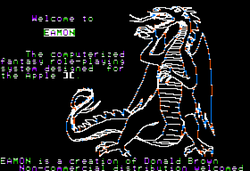Eamon

Eamon, sometimes known by the longer title The Wonderful World of Eamon, is a computer-based role-playing game series created by developer Donald M. Brown and released around late 1979 as free software. Designed for the Apple II series of computers, the game has since been ported to many other platforms and modified to create many unique variants. Eamon is distinctive for its role-playing elements, its longevity, its non-commercial nature, and its extensive library of adventures which includes at least 280 works by a host of contributors.
Pronunciations of the game's title vary; most sources rhyme it with the word demon.
This article is under construction.
Premise
Eamon casts the player as a member of the Guild of Free Adventurers, an organization headquartered in the city of Evenhold on the magical world of Eamon. The player equips their adventurer in the guild's Main Hall and can send them on various adventures to accumulate weapons, treasure, and expertise. Each individual adventure presents the player with its own unique set of goals, ranging from simply surviving or exiting the adventure to more complex tasks like rescuing individuals, finding special artifacts, or solving puzzles. The broader goal of Eamon is to accrue gold, acquire powerful weapons, and increase the adventurer's skills and abilities while having fun experiencing a range of different environments and challenges.
Game play
Game play in Eamon centers around going on adventures, which players do in order to accrue gold and weapons for their adventurers, to improve their skills, or simply to enjoy the experience of exploring or solving puzzles. A player may have any number of adventurers, each of whom consists of a name, sex, weapons, armor, gold, and various attributes stored on the Eamon Master disk.
When on an adventure, the player reads descriptions of the surroundings and events, and enters textual commands to make the adventurer act. When not on a mission, the adventurer resides at the Main Hall, a place where they can purchase weapons and armor, learn magical spells, or visit the bank.
Custom adventure-building is part of the game's appeal and a common piece of the Eamon experience for many players. Applications like the Eamon Dungeon Designer make it possible for players to create unique new adventures without having to perform any coding, though some coding expertise is necessary to create specialized custom effects.
History
Eamon was first conceived in the late 1970s by Des Moines resident and Dungeons & Dragons enthusiast Bill Fesselmeyer, who encouraged his friend Donald Brown, a talented programmer and student at Drake University, to create a computerized version of the role-playing game. Drawing on fantasy elements from D&D, Tolkien, and others, as well as the interfaces of other early text-based games like Colossal Cave Adventure, Brown coded the first version of Eamon in late 1979 and introduced it to his friends at the Computer Emporium in Des Moines. The game, which Brown released as non-commercial free software, was a hit and spread quickly as players shared it with their friends and other computer user groups.
Version history
| Version | Release | Details |
|---|---|---|
| 1.0 | 1979 | The original version by Donald Brown |
| 2.0 | ||
| 3.0 | ||
| 4.0 | ||
| 5.0 | ||
| 6.0 |
Variations
As a free, non-commercial game series that encouraged players to grow and extend it, Eamon served as an excellent starting point for developers wanting to make their own customized text adventure game systems. Some variations were relatively slight and kept compatibility with the wider Eamon corpus, while others made deeper overhauls that added significant new functionality. Still others took Eamon as a pattern for entirely new games, some which were sold commercially.
Apple II-based
Variants made for the original Apple II computer family, many based on Eamon's Applesoft BASIC code, were the first to appear and are the most common.
- SwordThrust (1981)
- —
- Knight Quest (1983)
- —
- Super Eamon (1985)
- —
- Lightning Eamon (1987)
- —
- Eamon IIgs (c. 1991)
- —
- HyperCard Eamon (1991)
- —
PC-based
Variations for PC systems:
- Eamon-PC
- —
Atari-based
Variations for the Atari computer family:
Commodore 64-based
Variations made for the Commodore 64:
- Imagery!
- —
Web or cross-platform
- Eamon AC
- —
- Eamon CS
- —
- EamonWeb
- —
External links
| |||||||||||||||||||||||